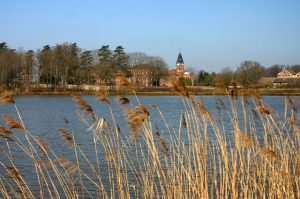Well, if you ever get invited to a chateau, be sure to bring a sleeping bag along. Of course, there are drawers full of ancient embroidered linens locked away safely in Louis XVI cabinets, but nobody knows where the keys are anymore. As for the tattered remains of the duvets, they are on the very top floor where the flies and the mice have taken over, and NO ONE goes up there. Ever.
Chateau life is full of pleasant and unusual surprises. When, for example, did you last get your hand kissed coming to the breakfast table? Or blow a French hunting horn in the main hallway? Or see a gentle pastel sunset over endless still water?
 My particular chateau is located in the Dombes—a fish-pond-filled plain half way to Lyon from Geneva. Originally purchased by our host’s great-great grandfather (a silk baron), it is perched on a slight rise in the flatness overseeing 1000 hectares (2471 acres) of water, canals and forest. You patrol the paths in a pair of old camouflage-green Citroen beach buggies which have a tendency towards flat tires and gear-box issues.
My particular chateau is located in the Dombes—a fish-pond-filled plain half way to Lyon from Geneva. Originally purchased by our host’s great-great grandfather (a silk baron), it is perched on a slight rise in the flatness overseeing 1000 hectares (2471 acres) of water, canals and forest. You patrol the paths in a pair of old camouflage-green Citroen beach buggies which have a tendency towards flat tires and gear-box issues.
You note that the ponds are low, and some have even disappeared completely. You observe the egrets and swans and positively hate the big black cormorants that stress the fish in the muddy shallow ponds.
You sleep little as the hunting dogs bark all night.
You visit the Saturday-morning market and want to buy a huge domestic goose and some fluffy hens that are for sale. For lunch you eat frog legs and pike mousse and tartar of carp. Your host tries to sell the restaurant chef the 15 tons of carp that he fishes annually from him ponds. This is beyond embarrassing: it is aristocratic. You give the waitress an outrageous tip.
You visit the great Abbey of Bourg en Bresse and admire the stained glass and the tomb of poor Marguerite of Austria/Savoy. You are enthralled and stuffed (fish dumplings) at the same time.
At apéro hour, the neighbours come to pay a courtesy call. They have rescue horses and dogs, and market-bought poultry, and a flock of guardian geese. They discuss the upcoming hunting season with our chateau host who wears a flak jacket, smokes a pipe, and loves knives. They leave at 9, as they have to dress for dinner.
For our supper there is a huge hunk of chateau Limousin beef resting in the fridge. You compose a magnificent Yorkshire pudding that you have whipped up by hand—a totally English dish perhaps never tasted before in this 13th-centure French demeure.
I loved my three nights at the chateau (yes, a chateau weekend begins on Thursday evening, in case you were not au courant) but it is also quite a relief to be back in my own simple kitchen where there is not one single stuffed boar head on the wall; where the cobwebs are amazingly discreet, and where I keep my compost bins outside.